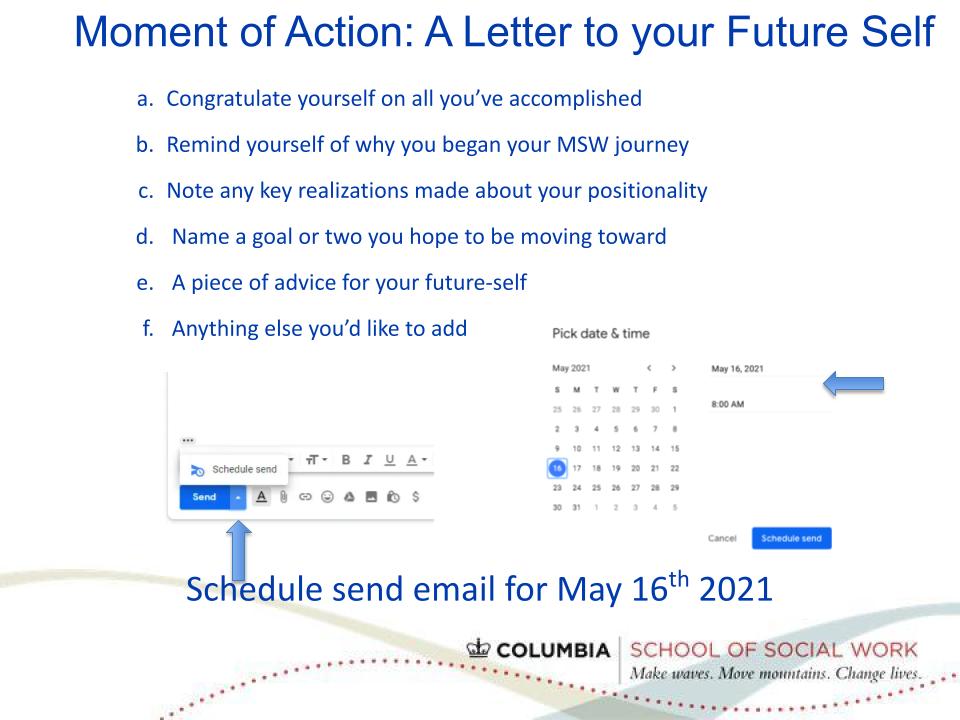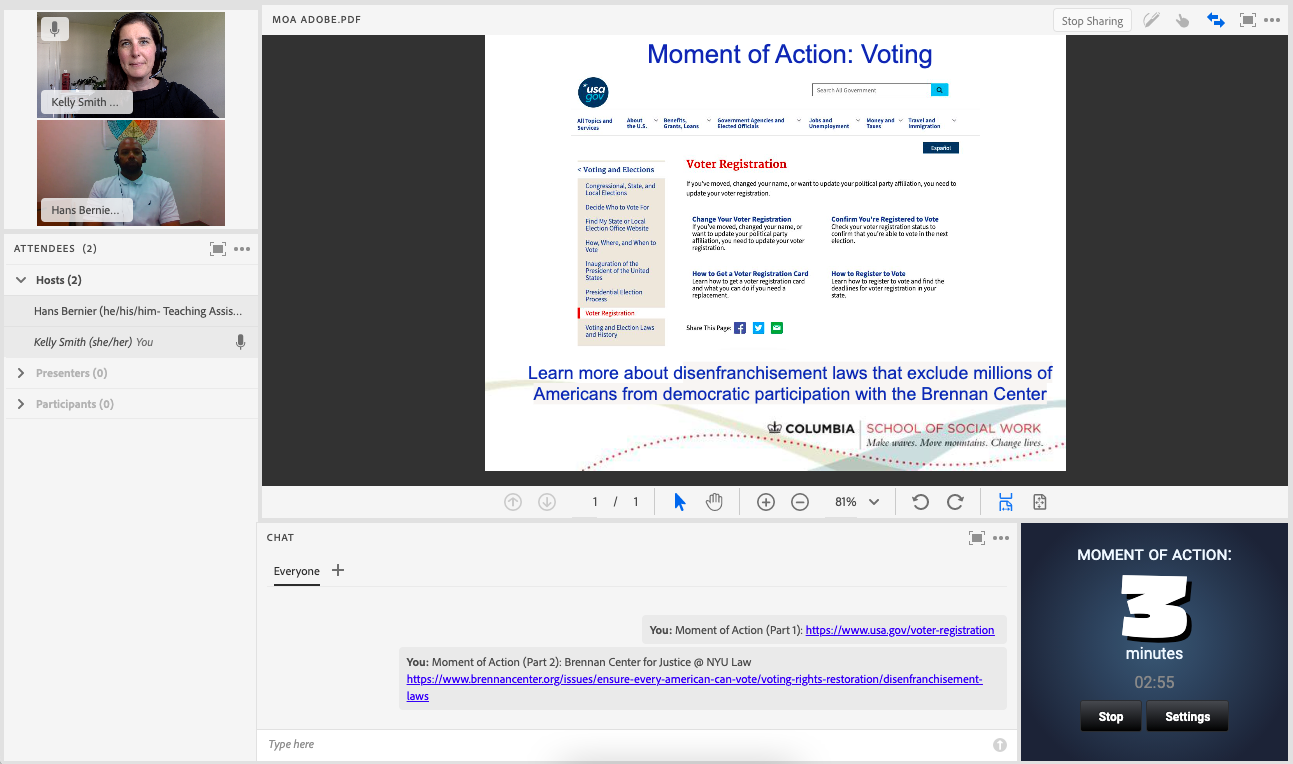An alternative to a Moment of Silence, a Moment of Action encourages student activism as a formalized opening exercise. Using a PROP-informed (power, racism, oppression, and privilege) framework, the Moment of Action is a practice that holds space in the classroom to acknowledge current events from a trauma-informed lens. This is especially necessary given the intensity of today’s political and social climate. The Moment of Action allows the whole class to share their perspectives, provide resources, and act in alignment with social work ethics. Its consistency, paired with the real-time flexibility to incorporate events, allows students to reflect on issues of importance before transitioning into the day’s coursework
Teaching and Learning Goal
The Moment of Action was implemented in a CSSW Online Campus course during the summer of 2020 amidst the backdrop of the global pandemic and resurgence of activism responding to anti-Black racism. As instructors, we, too, felt the need for connection to process the range of circumstances occurring. The Moment of Action is a trauma-informed practice that helps students engage with diverse, collaborative efforts relevant to social work values. With mutuality as a guiding principle, the Moment of Action embeds inclusive problem-solving and decision-making.
The practice establishes a predictable routine for students to acknowledge the myriad ways to collaborate in the social work community, from micro- to macro-level practice. It is also important to note that a financial commitment is never tied to any interventions or causes discussed. The Moment of Action creates opportunities for instructors to acknowledge and meaningfully respond to relevant issues balancing news coverage with the planned curriculum. Using a Moment of Action allows instructors to recognize the individual strengths and experiences when building this practice by centering the collective knowledge of all the course participants.
The trauma-informed principles exemplified include collaboration, resilience, peer support, mutuality, and empowerment. Finally, the activities create opportunities to foster relationships that honor the social work field and empower student choice in deciding whether to engage with or suggest Moments of Actions throughout the course.
Activity and Results
Each Moment of Action centered on participation in optional activism, providing ways for students to collaborate in the social work community and share their voices on the relevant issues. Activities for the Moment of Action were concrete responses to events happening nationally or closely related to the school and student geographies. Instructors connected topics with the National Association of Social Workers (NASW) Code of Ethics and the Power, Racism, Oppression, and Privilege curriculum materials.
Instructors can introduce the concept of the Moment of Action by comparing it to a moment of silence, which holds meaningful space in many situations. However, unlike a moment of silence, Moments of Action offer unique opportunities to simultaneously acknowledge events in real-time while building community. Additionally, the practice provides students opportunities to engage with the NASW professional ethical principles to “help people in need and to address social problems; challenge social injustice; [and] respect the inherent dignity and worth of the person” (NASW, 2021).
Integrating the social problems of our day and their interactions between the micro, mezzo, and macro systems also helped highlight the role of policy in problem identification and the various intervention options. The consistency of the Moment of Action, paired with its flexibility to incorporate current events, allows students to tie the issues of importance into their coursework. Protecting this time acknowledges the importance of social justice in social work scholarship and practice while also maintaining space for the curriculum. Predictability and routines in the classroom also help support student resilience while facing the unprecedented uncertainty present during the summer of 2020. The Moment of Action culminated in students schedule-sending an email to their “future self” during their graduation week (see Image 1). This cumulative Moment of Action offers students space for self-reflection, recognition, acknowledgment, and a piece of advice specifically around their advocacy work throughout the course.
Image 1: Slide introducing the activity Moment of Action: A Letter to your Future Self
Image 1 Alt-Text: This screengrab is from our final slide deck from the session on August 26, 2020. The slide presented includes the text: “Moment of Action: A Letter to your Future Self”
- Congratulate yourself on all you’ve accomplished
- Remind yourself of why you began your MSW journey
- Note any key realizations made about your positionality
- Name a goal or two you hope to be moving toward
- A piece of advice for your future-self
- Anything else you’d like to add
Schedule send email for May 16th 2021”

Technical Details and Steps
Each class included an introductory slide to share the Moment of Action. In Adobe Connect, the classroom includes pods for the instructor video(s), slide view, timer, and chat box (see Image 2). Instructors or students open the 5-minute discussion around the Moment of Action and primarily use the chat feature to share additional resources and hold conversations.
For our course, the Moment of Action occurred at the beginning of each session. This practice gave students a sense of predictability and assurance that the community will process critical events that may be tangential to the curriculum but deeply connected to social work values. Instructors carefully note any content warnings, and students always have the option to use the time for self-care rather than engage with the suggested actions.
In a given class, the lead lecturer explicitly labels and talks through the current event, with intentional fluidity for student interjection to disrupt the presumption that knowledge lies only with the educational practitioner. For example, after the general introduction, the instructor may say, "For today's Moment of Action, we wanted to create space to discuss this week's events before moving into the lesson." The beauty of the Moment of Action is its combination of structure and fluidity, so each class community can make it what it needs to meet specific student needs and resilience. Table 1 shows the topics covered each week during our course.
Students consistently responded positively to the various Moments of Action, noting in course evaluations, "the moments of action were really interesting." During the Moments of Action, students consistently share affirming comments and gratitude for the space to discuss and activate one another toward social justice and offer additional resources in the chat. Students are warmly encouraged to join the discussion in chat, over mic, or on video; many did so as the topics resonated with their experiences, geography, and needs. As instructors, we created a space of choice for students, encouraging students to feel empowered about their decisions to participate actively or not. Since the Moment of Action topics intentionally incorporate current events, the issues and resources were often top of mind for many in the class community as they entered the academic space. The consistent processing time became a key community-building opportunity in this way. The course evaluation question: "What did the instructor do that was most helpful?" led to student responses such as, "provided daily moments of action, allowing students to partake in social justice outside of the classroom" and "[what] was most helpful was to give us so much to reflect upon, she really has promoted our growth intellectually, and academically…[instructors] covered difficult and sensitive material, sensitively." Other students reflected upon the resources provided, sharing the course "provided outstanding outside resources…This allowed students to receive education other than from textbooks, readings, assignments, and from regular class lectures."
Table 1: Moment of Action Agenda for Advanced Standing Integrative Seminar, Summer 2020. Here is a list of the Moments of Action discussed during each class session from our Advanced Standing Integrative Seminar SOCW T7105, Summer 2020. The active hyperlinks highlight the agencies, causes, and movements provided to facilitate each conversation.
|
Week 1: VOTE!
Week 2
Week 3
Week 4
Week 5
|
Week 6
- Thank Kamala Harris for persevering despite racism and misogyny @KamalaHarris
Week 7
Week 8: VOTE!
Week 9
Week 10
- Draft a letter to your future self - scheduled for arrival during graduation week (see Image 1)
|
What this looked like in Adobe Connect
Image 2: Moment of Action in Adobe Connect. Adobe product screenshot(s) reprinted with permission from Adobe.
Image 2 Alt-Text: This screengrab is from a mock classroom to comply with FERPA. The slide reads “Moment of Action: Voting” at top top, and the body of the slide shows a screengrab of a website for voter registration that’s linked in the chat (link below). Below that, it says “Learn more about disenfranchisement laws that exclude millions of Americans from democratic participation with the Brennan Center.” The former Columbia School of Social Work logo and the slogan “Make waves. Move mountains. Change lives.” also appear in the bottom right corner of the slide. In the chat pod, the instructor shares the following text and links: “Moment of action (Part 1): https://edtechbooks.org/-qiDX” and “Moment of Action (Part 2): Center for Justice @ NYU Law https://edtechbooks.org/-EbhD” 
Acknowledgements
We are grateful for the camaraderie provided by CSSW and the OLC team, guided by the inclusive and encouraging leadership style of Assistant Dean Marquart.
References
National Association of Social Workers. (2021). NASW code of ethics. https://edtechbooks.org/-CuAsn
Smith, K. & Bernier, H. (2022). Moment of action. In P. Thompson & J. Carello (Eds.), Trauma-informed pedagogies: A guide for responding to crisis and inequality in higher education. Palgrave Macmillan.
Smith, K. & Bernier, H. (2021, February 26). A Moment of Action: Opening an Inclusive, Engaged, and Trauma-Informed Classroom [Conference session]. Teachers College, Columbia University Winter Roundtable Conference, New York, NY, United States.https://edtechbooks.org/-DLQC